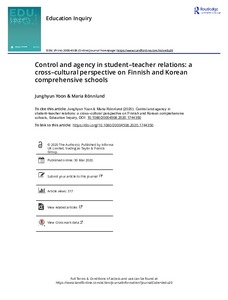Control and agency in student–teacher relations: a cross–cultural perspective on Finnish and Korean comprehensive schools
Junghyun Yoon; Maria Rönnlund
Control and agency in student–teacher relations: a cross–cultural perspective on Finnish and Korean comprehensive schools
Junghyun Yoon
Maria Rönnlund
Routledge, Taylor & Francis Group
Julkaisun pysyvä osoite on:
https://urn.fi/URN:NBN:fi-fe2021042821640
https://urn.fi/URN:NBN:fi-fe2021042821640
Tiivistelmä
Drawing on a cross-cultural, qualitative study in Finnish and Korean
comprehensive schools, we explore how teacher control and student agency
are manifested and exercised in the teaching and learning practices of
the “official school” and in the student–teacher interactions of the
“informal school”. We also elaborate on how students reflect on control
and agency. Bernstein’s concepts of framing and classification are
employed as a theoretical lens with which to examine control, agency and
hierarchy. Data consists of school observations and interviews with
students aged 12 to 14 and their teachers, conducted in six schools. The
findings indicate that student agency is intensively constrained in
their participation in teaching-learning practices. The analysis also
reveals a paradox where students do not welcome increasing their agency
through student-oriented lessons. Moreover, the controlling and caring
roles of teachers and the exertion and limitation of student agency
appear differently in the Finnish and Korean schools studied. Students
seem to desire a refined balance between control and agency while
revealing conforming and self-critical attitudes towards the school
system and teacher control. Finally, our analyses of control, agency and
hierarchy among school members leads this article into a discussion of
democratic school culture from a cross-cultural perspective.
comprehensive schools, we explore how teacher control and student agency
are manifested and exercised in the teaching and learning practices of
the “official school” and in the student–teacher interactions of the
“informal school”. We also elaborate on how students reflect on control
and agency. Bernstein’s concepts of framing and classification are
employed as a theoretical lens with which to examine control, agency and
hierarchy. Data consists of school observations and interviews with
students aged 12 to 14 and their teachers, conducted in six schools. The
findings indicate that student agency is intensively constrained in
their participation in teaching-learning practices. The analysis also
reveals a paradox where students do not welcome increasing their agency
through student-oriented lessons. Moreover, the controlling and caring
roles of teachers and the exertion and limitation of student agency
appear differently in the Finnish and Korean schools studied. Students
seem to desire a refined balance between control and agency while
revealing conforming and self-critical attitudes towards the school
system and teacher control. Finally, our analyses of control, agency and
hierarchy among school members leads this article into a discussion of
democratic school culture from a cross-cultural perspective.
Kokoelmat
- Rinnakkaistallenteet [27094]
